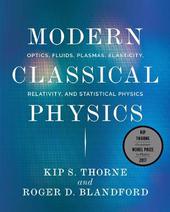
|
Modern Classical Physics: Optics, Fluids, Plasmas, Elasticity, Relativity, and Statistical Physics
Hardback
Main Details
| Title |
Modern Classical Physics: Optics, Fluids, Plasmas, Elasticity, Relativity, and Statistical Physics
|
| Authors and Contributors |
By (author) Kip S. Thorne
|
|
By (author) Roger D. Blandford
|
| Physical Properties |
| Format:Hardback | | Pages:1552 | | Dimensions(mm): Height 254,Width 203 |
|
| Category/Genre | Physics |
|---|
| ISBN/Barcode |
9780691159027
|
| Classifications | Dewey:530 |
|---|
| Audience | | Tertiary Education (US: College) | | Professional & Vocational | |
|---|
| Illustrations |
349 color illus. 6 halftones. 15 tables.
|
|
Publishing Details |
| Publisher |
Princeton University Press
|
| Imprint |
Princeton University Press
|
| Publication Date |
5 September 2017 |
| Publication Country |
United States
|
Description
This first-year, graduate-level text and reference book covers the fundamental concepts and twenty-first-century applications of six major areas of classical physics that every masters- or PhD-level physicist should be exposed to, but often isn't: statistical physics, optics (waves of all sorts), elastodynamics, fluid mechanics, plasma physics, and special and general relativity and cosmology. Growing out of a full-year course that the eminent researchers Kip Thorne and Roger Blandford taught at Caltech for almost three decades, this book is designed to broaden the training of physicists. Its six main topical sections are also designed so they can be used in separate courses, and the book provides an invaluable reference for researchers. * Presents all the major fields of classical physics except three prerequisites: classical mechanics, electromagnetism, and elementary thermodynamics * Elucidates the interconnections between diverse fields and explains their shared concepts and tools * Focuses on fundamental concepts and modern, real-world applications * Takes applications from fundamental, experimental, and applied physics; astrophysics and cosmology; geophysics, oceanography, and meteorology; biophysics and chemical physics; engineering and optical science and technology; and information science and technology * Emphasizes the quantum roots of classical physics and how to use quantum techniques to elucidate classical concepts or simplify classical calculations * Features hundreds of color figures, some five hundred exercises, extensive cross-references, and a detailed index * An online illustration package is available to professors
Author Biography
Kip S. Thorne is the Feynman Professor Emeritus of Theoretical Physics at Caltech. His books include "Gravitation" and "Black Holes and Time Warps". Roger D. Blandford is the Luke Blossom Professor of Physics and the director of the Kavli Institute of Particle Astrophysics and Cosmology at Stanford University. Both are members of the National Academy of Science.
Reviews"Winner of the 2018 PROSE Award in Textbook / Physical Sciences and Mathematics, Association of American Publishers" "Kip S. Thorne, Co-Winner of the 2017 Nobel Prize in Physics" "Roger D. Blandford, Co-Winner of the 2016 Crafoord Prize in Astronomy and Winner of the 2020 Shaw Prize in Astronomy" "It is a matter for celebration when two illustrious theoreticians such as Kip Thorne and Roger Blandford provide an in-depth description of the fundamentals of classical physics. . . . The sheer amount of material covered and the effort that has gone into condensing it into a single, beautifully produced volume is extraordinarily impressive."---Malcolm Longair, Nature "A tour through macroscopic physics that features modern treatments of classical topics and insightful treatments of modern ones. . . . Modern Classical Physics is a magnificent achievement."---Edward Witten, Physics Today "An excellent tool for students and researchers as an introduction to classical subjects usually missing from most modern physics curricula. . . . A valuable reference for physicists about modern approaches of the development and applications of classical physics."---Miguel A. F. Sanjuan, Contemporary Physics
|